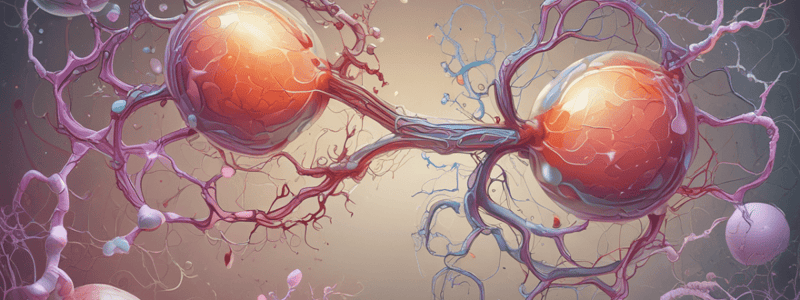Podcast
Questions and Answers
Which ketone body is mainly volatilized in the lungs?
Which ketone body is mainly volatilized in the lungs?
Which enzyme plays a critical role in regulating the entry of fatty acids into the oxidative pathway?
Which enzyme plays a critical role in regulating the entry of fatty acids into the oxidative pathway?
What happens to CPT-I activity and lipolysis in a well carbohydrate-fed state?
What happens to CPT-I activity and lipolysis in a well carbohydrate-fed state?
Which condition is NOT directly associated with ketosis?
Which condition is NOT directly associated with ketosis?
Signup and view all the answers
What is the primary consequence of prolonged ketosis?
What is the primary consequence of prolonged ketosis?
Signup and view all the answers
In the context of diabetes mellitus, what primarily causes excess lipolysis?
In the context of diabetes mellitus, what primarily causes excess lipolysis?
Signup and view all the answers
What happens to excess acetyl-CoA during ketogenesis?
What happens to excess acetyl-CoA during ketogenesis?
Signup and view all the answers
How does CPT-I activity change during starvation or a low carbohydrate diet?
How does CPT-I activity change during starvation or a low carbohydrate diet?
Signup and view all the answers
Study Notes
Ketonemia
- Ketonemia is the presence of excess ketone bodies in the blood.
- It is usually caused by increased production of ketone bodies by the liver rather than reduced utilization by extrahepatic tissues.
Ketone Bodies
- Acetoacetate and 3-hydroxybutyrate can be readily reformed into acetyl-CoA.
- Acetone is difficult to reform into acetyl-CoA and is largely volatilized in the lungs.
Regulation of Ketogenesis
- Ketogenesis is mainly regulated by nutritional status.
- After uptake of free fatty acids by the liver, they can be:
- β-oxidized to form acetyl-CoA that enters the citric acid cycle, with excess acetyl-CoA forming ketone bodies.
- Esterified to form triacylglycerol and phospholipid.
Carnitine Palmitoyltransferase-I (CPT-I)
- CPT-I regulates the entry of fatty acids into the oxidative pathway.
- CPT-I activity is affected by nutritional status:
- In a well-carbohydrate-fed state:
- CPT-I activity is low.
- Lipolysis is decreased.
- β-oxidation and ketogenesis are depressed.
- Most fatty acids are esterified to form triacylglycerol and phospholipid.
- In starvation or a low-carbohydrate diet:
- CPT-I activity is high.
- Lipolysis is increased.
- β-oxidation is increased.
- More acetyl-CoA is converted to ketone bodies.
- In a well-carbohydrate-fed state:
Clinical Aspects of Ketogenesis
- Ketoacidosis results from prolonged ketosis.
- Higher-than-normal quantities of ketone bodies in the blood and/or urine constitute ketonemia (hyperketonemia) and/or ketonuria, respectively.
- Ketosis occurs in:
- Starvation.
- Pathologic states, such as:
- Diabetes mellitus due to:
- Reduced glucose utilization for energy production.
- Excess lipolysis due to the absence or defect of insulin.
- Hypoglycemia due to:
- Reduced glucose concentration available for energy production.
- Excess lipolysis due to the reduction of insulin.
- Diabetes mellitus due to:
Studying That Suits You
Use AI to generate personalized quizzes and flashcards to suit your learning preferences.
Description
This quiz covers the concept of ketonemia, the presence of excess ketone bodies in the blood, and the regulation of ketogenesis, including the role of nutritional status.

